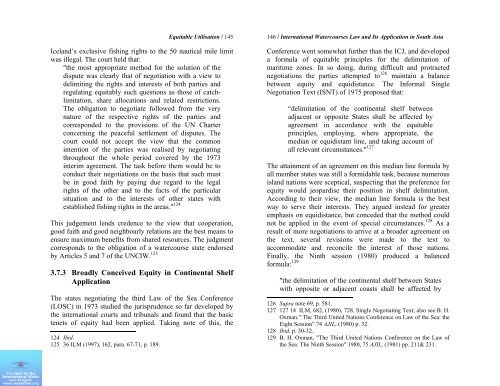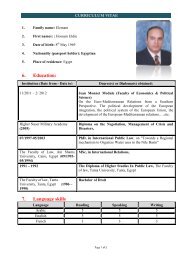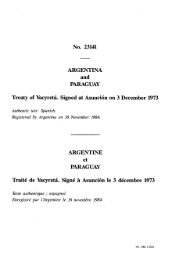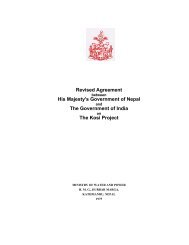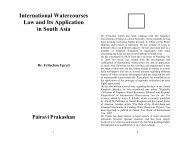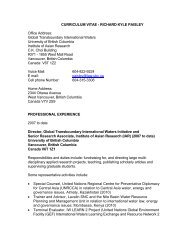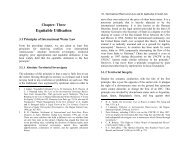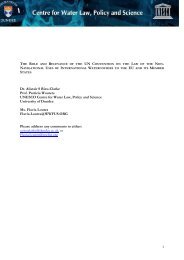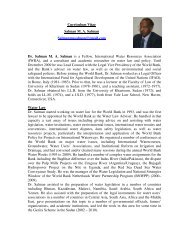Upreti, Trilochan, International Watercourses Law and Its Application ...
Upreti, Trilochan, International Watercourses Law and Its Application ...
Upreti, Trilochan, International Watercourses Law and Its Application ...
You also want an ePaper? Increase the reach of your titles
YUMPU automatically turns print PDFs into web optimized ePapers that Google loves.
Equitable Utilisation / 145 146 / <strong>International</strong> <strong>Watercourses</strong> <strong>Law</strong> <strong>and</strong> <strong>Its</strong> <strong>Application</strong> in South AsiaIcel<strong>and</strong>’s exclusive fishing rights to the 50 nautical mile limitwas illegal. The court held that:"the most appropriate method for the solution of thedispute was clearly that of negotiation with a view todelimiting the rights <strong>and</strong> interests of both parties <strong>and</strong>regulating equitably such questions as those of catchlimitation,share allocations <strong>and</strong> related restrictions.The obligation to negotiate followed from the verynature of the respective rights of the parties <strong>and</strong>corresponded to the provisions of the UN Charterconcerning the peaceful settlement of disputes. Thecourt could not accept the view that the commonintention of the parties was realised by negotiatingthroughout the whole period covered by the 1973interim agreement. The task before them would be toconduct their negotiations on the basis that such mustbe in good faith by paying due regard to the legalrights of the other <strong>and</strong> to the facts of the particularsituation <strong>and</strong> to the interests of other states withestablished fishing rights in the areas." 124This judgement lends credence to the view that cooperation,good faith <strong>and</strong> good neighbourly relations are the best means toensure maximum benefits from shared resources. The judgmentcorresponds to the obligation of a watercourse state endorsedby Articles 5 <strong>and</strong> 7 of the UNCIW. 1253.7.3 Broadly Conceived Equity in Continental Shelf<strong>Application</strong>The states negotiating the third <strong>Law</strong> of the Sea Conference(LOSC) in 1973 studied the jurisprudence so far developed bythe international courts <strong>and</strong> tribunals <strong>and</strong> found that the basictenets of equity had been applied. Taking note of this, the124 Ibid.125 36 ILM (1997), 162, para. 67-71, p. 189.Conference went somewhat further than the ICJ, <strong>and</strong> developeda formula of equitable principles for the delimitation ofmaritime zones. In so doing, during difficult <strong>and</strong> protractednegotiations the parties attempted to 126 maintain a balancebetween equity <strong>and</strong> equidistance. The Informal SingleNegotiation Text (ISNT) of 1975 proposed that:“delimitation of the continental shelf betweenadjacent or opposite States shall be affected byagreement in accordance with the equitableprinciples, employing, where appropriate, themedian or equidistant line, <strong>and</strong> taking account ofall relevant circumstances." 127The attainment of an agreement on this median line formula byall member states was still a formidable task, because numerousisl<strong>and</strong> nations were sceptical, suspecting that the preference forequity would jeopardise their position in shelf delimitation.According to their view, the median line formula is the bestway to serve their interests. They argued instead for greateremphasis on equidistance, but conceded that the method couldnot be applied in the event of special circumstances. 128 As aresult of more negotiations to arrive at a broader agreement onthe text, several revisions were made to the text toaccommodate <strong>and</strong> reconcile the interest of those nations.Finally, the Ninth session (1980) produced a balancedformula: 129"the delimitation of the continental shelf between Stateswith opposite or adjacent coasts shall be affected by126 Supra note 69, p. 581.127 127 14 ILM, 682, (1980), 728, Single Negotiating Text; also see B. H.Oxman," The Third United Nations Conference on <strong>Law</strong> of the Sea: theEight Session” 74 AJIL, (1980) p. 32.128 Ibid. p. 30-32.129 B. H. Oxman, "The Third United Nations Conference on the <strong>Law</strong> ofthe Sea: The Ninth Session" 1980, 75 AJIL, (1981) pp. 211& 231.


